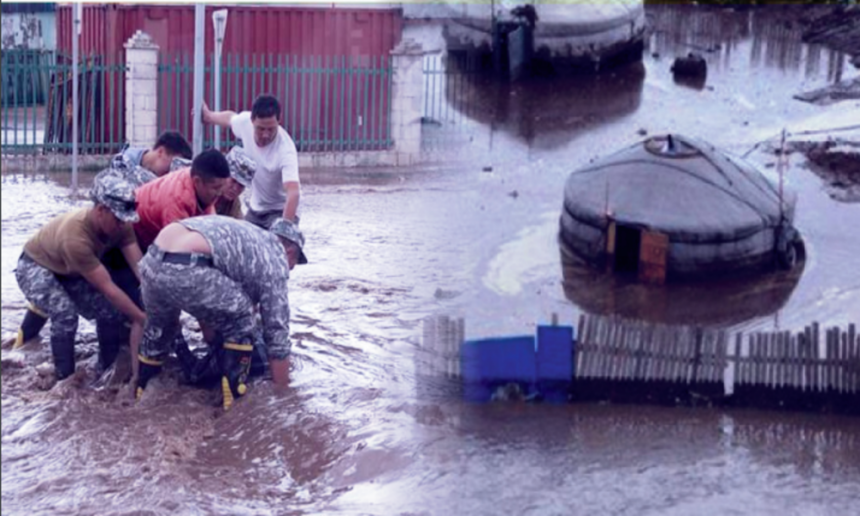This is a slightly tweaked version of a column I wrote exactly nine years ago. The flash floods of last week sent our city sinking in its sewage. This shows how the capabilities of our government have deteriorated over time, and there is no difference to how the authorities are acting. Are we going to spend another ten years breathing in and living in an environment polluted by sewage?
The Economist, the well-known international news journal, starts each issue with the following: “First published in September 1843 to take part in ‘a severe contest between intelligence, which press forward, and an unworthy, timid ignorance obstructing our progress.” This fight, which started 166 years ago in England, is currently going full steam ahead in Mongolian society. Unfortunately, this has morphed into an unfair fight, where reasoning and intelligence are on the losing side.
There is a small group of people who pretend to care and prefer to keep the public away from the truth. They come to political power in turns and work with each other to skew people’s perceptions, so that they become wealthy by stealing from public funds. These discreet and indecent actions of theirs are now causing serious implications for people’s freedom and safety in Mongolia.
The most recent example is the flash floods that swept through Ulaanbaatar city in the last few days. This episode is only a reminder of the greater threat ahead.
A short but heavy rainfall turned into a flash flood in no time. It sent the city into turmoil, doing significant damage to people’s properties and more tragically causing several deaths. The flooding swept through ger districts located on Ulaanbaatar’s hillsides, which resulted in sewage from pit toilets settling in the city’s downtown. This was the reason why everyone’s lungs felt polluted and eyes itchy when the sun emerged again. Regardless of living in gers or apartment blocks, people were trying to stop leaking water from their poorly constructed roofs and walls. Carrying buckets of water and feeling disgusted by the sewage, people succumbed to a feeling of despair and helplessness.
Helping people out and fixing the damanged roads should clearly be our immediate priority. However, the biggest challenge is what we must do in order to not repeat this and not let a few hours of rainfall bring disaster to our capital city.
If you listen to the authorities, they blame the whole thing on the forces of nature and demand more from centrally allocated funds. They will pretend to hold culprits accountable by issuing a few decrees or statements.
Unless the root cause of this problem is fixed, it will repeat itself next time we have heavy rainfall. But we know what the problem is – the governance crisis that is deep-seated in our government and society. Those who created this crisis are responsible for not only for the damage dealt by this flooding, but also similar consequences that may arise in the future.
We have all seen how the authorities of Ulaanbaatar have been getting wealthier by trading public land instead of properly planning and developing our infrastructure. Senior officials in suburbs and districts have been abusing their power at their levels and been issuing permits everywhere. As a result, dams that were supposed to protect us from flash floods have been taken down, so that new buildings or fences could be erected. This means only a small amount of rainwater can cause significant flooding damage to our city. Furthermore, the majority of streets are now blocked by fences, preventing fire trucks from reaching their destination. This means that only a small fire could burn down an entire suburb.
These disasters are the direct result of mismanagement by the Ulaanbaatar authorities who have been stealing from public funds instead of protecting and taking care of them. You reap what you sow.
The city authorities have a strong interest in keeping Ulaanbaatar’s infrastructure underdeveloped. If roads and sewage systems were built in the outskirts of the city, the land in the inner city would reduce in value, meaning they would no longer be able to make as much money from trading land. In a more general sense, if it didn’t make profit or financial gain, there would be no one working in government.
We all know how to escape this crisis in public governance – the culprits must be held accountable. The authorities understand this, however they are reluctant to do so because it would also reveal their own abuses of power and secret connections.
If there are still clean-handed, righteous people left in those political parties, they must hold the guilty ones accountable and revive the reputation of their authority. This is how our society should progress. Otherwise, history will hold them accountable and these political parties should eventually disappear. Diseases can either be treated or die with the person.
Intelligence always prevails over ignorance in the end. It is only a matter of time. One day Ulaanbaatar won’t have any ger districts, and every family will enjoy proper housing connected to proper infrastructure and sewage systems.
This will be the day when corruption is gone. This will be the day when you can’t become a city resident by building your ger or fence in a random location without any planning. Also, this will be the day when a few hours of rainfwall doesn’t cause flash floods in our city. We will be living in safe, securing housing without such worries.
But the question is, how soon will that day come?
“Unuudur” newspaper 2009.07.28
Trans. by B.Amar












